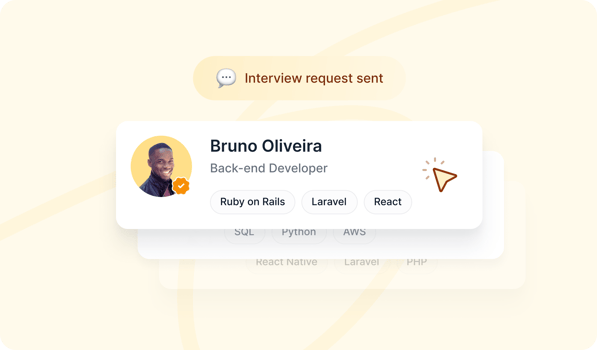Hire Remote Mobile Developers Effectively in 2025
Mobile app development plays a vital role in the growth and success of businesses in today's digital landscape. To meet the increasing demand for mobile apps and stay ahead of the competition, companies need to hire skilled and experienced mobile developers. Whether you need a native iOS or Android app, a cross-platform solution, or a mobile-optimized web app, finding the right developers is crucial.
Hiring mobile app developers can be challenging due to the wide range of skills and expertise required. Mobile developers must possess a diverse skill set, including technical proficiency in programming languages such as Java, Kotlin, Swift, and JavaScript and knowledge of Android app development frameworks and tools. Additionally, they should be familiar with app design principles and understand user experience (UX) considerations and the specific requirements of their target operating systems and app stores.
When hiring mobile developers, it is essential to consider their previous experience and portfolio. Evaluating their past clients and projects can provide valuable insights into their capabilities and the quality of their work. Practical communication skills are also essential, as developers must collaborate effectively with project managers, designers, and other team members throughout the development process.
The following sections will delve into the critical skills to look for when hiring mobile developers and address common questions related to the hiring process. By understanding these factors and implementing a structured hiring process, businesses can find the right talent to turn their app ideas into reality and thrive in the competitive mobile app market.
What to Look for When Hiring Mobile Developers
Technical Skills
When hiring mobile app developers, it is crucial to assess their technical skills to ensure they have the expertise to develop high-quality mobile apps. Depending on their technological platform, mobile developers should be proficient in programming languages such as Java, Kotlin, Swift, or JavaScript. They should have a solid understanding of mobile app development frameworks and tools like React Native, Flutter, or Xamarin.
Additionally, knowledge of app design principles, user interface (UI) development, and API integrations is essential for creating seamless and feature-rich mobile experiences. Please be sure to look for candidates with a track record of building successful mobile apps and demonstrating a solid command of the technical aspects of mobile app development.
Communication Skills
Effective communication is vital for mobile developers as they often work collaboratively with project managers, designers, and other app development team members. Mobile developers must clearly understand project requirements, provide regular updates, and actively participate in discussions and problem-solving.
Strong communication skills enable them to articulate technical concepts to non-technical stakeholders and ensure smooth coordination within the development team. Look for developers who can effectively communicate complex ideas, actively listen to others, and adapt their communication styles to different audiences. Good communication skills improve project management, efficient teamwork, and successful project outcomes.
Mobile App Security
Mobile app security is crucial to mobile development in today's digital landscape. With increasing data breaches and privacy concerns, hiring mobile developers who prioritize security is essential. Look for developers with experience implementing security measures such as secure data storage, encryption, authentication, and network communication.
Knowledge of best practices for securing user data and protecting against common vulnerabilities is vital. The right mobile app developer should be able to assess and mitigate potential security risks in their code and follow industry standards and guidelines for secure mobile app development.
Cross-Platform Development
Cross-platform development has gained significant popularity, allowing businesses to reach a wider audience with a single codebase. When hiring app developers, consider their expertise in cross-platform development frameworks like React Native, Flutter, or Xamarin. Hire mobile app developers who understand the pros and cons of cross-platform development and can make informed decisions on when to use cross-platform solutions versus native development.
Experience creating performant and responsive cross-platform apps that deliver a native-like experience on multiple platforms is valuable. Assess their knowledge of platform-specific APIs and their ability to optimize app performance across different operating systems.
Top 5 Mobile Developer Interview Questions
How do you integrate a third-party library or SDK into a mobile application?
This question evaluates a candidate's practical experience integrating external libraries or software development kits (SDKs) into mobile apps. The answer should highlight their understanding of dependency management, version compatibility, and the integration process.
A comprehensive response would include adding the library as a dependency, configuring build settings, importing necessary modules, and ensuring proper initialization and usage of the library's features. It reveals the candidate's familiarity with the practical aspects of incorporating external resources into a successful mobile app.
What is the Singleton pattern?
The Singleton pattern is a widely used design pattern in software development. Asking about it helps you assess a candidate's familiarity with design patterns and ability to create efficient and reusable code.
A desirable response is that the Singleton pattern restricts the instantiation of a class to a single object, ensuring that there is only one instance of the class throughout the application. The candidate should discuss the Singleton pattern's benefits, such as global access to the object and efficient resource utilization.
What is the difference between ARC (Automatic Reference Counting) and GC (Garbage Collection)?
This question assesses a candidate's knowledge of memory management in different programming languages, particularly iOS development with ARC and Android development with GC. An ideal answer would highlight that ARC is a memory management technique used in Objective-C and Swift, where the system automatically tracks object references and deallocates memory when it is no longer referenced.
On the other hand, GC (Garbage Collection) is a memory management approach used in languages like Java, where the system periodically scans memory to identify and reclaim unused objects. The candidate should discuss the advantages and limitations of each approach.
What do you think is the best way to handle errors in a mobile application?
Asking about error handling demonstrates the candidate's understanding of robust app development practices and problem-solving abilities. A firm answer would emphasize the importance of implementing proper error-handling mechanisms, including logging errors, providing meaningful error messages to users, and gracefully handling exceptions.
It should also highlight the significance of proactive error prevention through code reviews, automated testing, and comprehensive error-handling strategies. Discussing this query allows you to assess the candidate's attention to detail, knowledge of best practices in error handling, and ability to ensure a smooth user experience in the face of potential errors.
What are some best practices to avoid memory leaks on mobile?
Memory leaks can significantly impact app performance and user experience. This question allows you to assess a candidate's familiarity with memory management practices specific to mobile app development.
An excellent response would include mentioning techniques such as releasing resources in the correct lifecycle methods, using weak references for long-lived objects, avoiding unnecessary object retention, and being mindful of static references. The candidate should demonstrate an understanding of the importance of efficient memory management to prevent crashes and improve app responsiveness.









